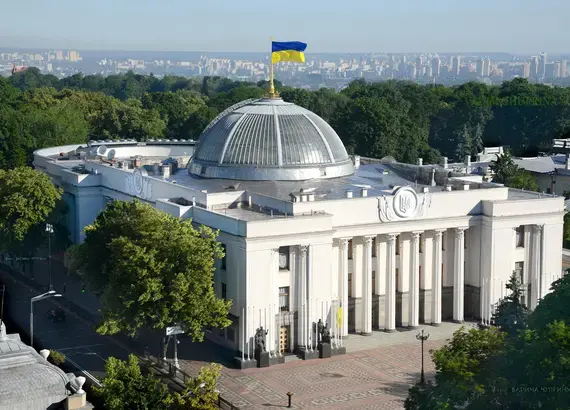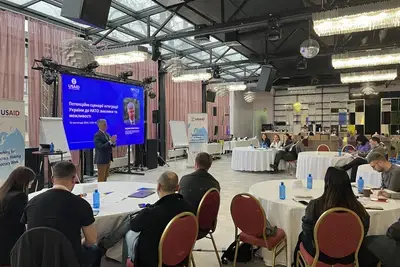
The dome of the Verkhovna Rada (Ukrainian parliament) in Kyiv, Ukraine.
Success Story
Ukraine: Consensus-Building Efforts Lay Groundwork for Cross-Party Reform
Ukraine’s parliament (Verkhovna Rada) is in a race to deliver the sweeping democratic reforms demanded by Ukrainians during the Revolution of Dignity. However, faced with an economic crisis and ongoing war, parties in parliament have struggled to enact these policies. Current legislative procedures and fragmented political dynamic among parliamentary factions have only compounded the challenges of pushing through changes. Public frustration with the pace of reform has risen sharply over the last year, and time is running out to deliver on the promises made on the Maidan. Developing a culture of consensus building among parties at the national level is an important step to ensuring that these national reforms, which are crucial to safeguarding Ukraine’s successful democratic transition, are enacted.
It was thus a significant achievement when the Prime Minister and Parliamentary Speaker of Ukraine recently joined leaders from seven parliamentary factions at the Jean Monnet House near Paris to demonstrate their commitment to building consensus around key institutional reforms in the Rada. The negotiations resulted in an agreement among the seven factions to implement four reform priorities and plans to establish a parliamentary working group that will oversee the implementation of these policies. This agreement represented a breakthrough in Ukrainian parliamentary cooperation and will serve as a foundation for further cross-faction collaboration.
The conference was part of a larger consensus-building process, known as the Jean Monnet Dialogues (the Dialogues). This process began earlier in 2016, when the Rada adopted all 52 recommendations outlined in the European Parliament’s Report on Internal Reform and Capacity-Building in the Rada, also known as the “Cox Report,” after Pat Cox, former President of the European Parliament. Chapter six of the report provides guidance relating to building trust and consensus within and among parties in parliament. Given the National Democratic Institute’s (NDI) experience supporting cross-party cooperation and consensus building in Ukraine, the authors of the report asked NDI to work jointly with the European Parliament team and the Oslo Center for Peace and Human Rights (the Oslo Center) to help the Rada implement the chapter-six proposals. With the European Parliament’s technical knowledge of parliamentary procedure and the Oslo Center’s expertise in Norwegian coalition politics as well as its track record in facilitating coalition and consensus-building study trips, the three institutions are complementary partners.
Based on the Cox report recommendations, NDI, the European Parliament, and the Oslo Center jointly developed the Dialogues, which are organized in cycles. Each stage of a cycle is designed to give participants experience in building consensus across party lines as they work toward the common goals of implementing the Report recommendations. The stages include preparatory meetings in Kyiv followed by more structured, cross-party meetings at the Jean Monnet house, a historic property owned by the European Parliament and used as a conference site. For example, in the lead-up to the first conference, NDI and the European Parliament facilitated a series of preliminary consultations in Kyiv among faction leaders and parliamentary staff to agree upon the rules of engagement, attendees, format, and substantive issues for discussion at the conference. Once parliament begins to implement the steps agreed upon, the faction leaders and staff will begin the next cycle of dialogues, focusing on another set of recommendations.
During the conference, the discussion focused on four topics:
- requiring the government to provide “white papers” when it submits legislation for consideration;
- requiring annual ministry reports to the Rada;
- considering the adoption of proportional representation (the D’Hondt method) to determine the party composition of Rada committees; and
- regulating the status of the parliamentary opposition.
The conference concluded with a joint statement that affirmed these priorities and called for the establishment of a cross-party parliamentary working group to oversee the implementation of these, and future, reforms. The working group was formally established in November.
The Jean Monnet Dialogues have benefit beyond reforming parliamentary procedures in Ukraine. The factions see the process as a way to change the political culture of Ukraine. By helping party leaders to work across party lines, the dialogues are establishing a lasting framework to achieve the broader democratic reforms demanded by Ukrainians on the Maidan.
NDI and our partners would like to thank the donors who have made this effort and efforts like these possible. The Jean Monnet Dialogues were supported, in part, by the United State Agency for International Development and the Norwegian Ministry of Foreign Affairs.
Published January 3, 2017



